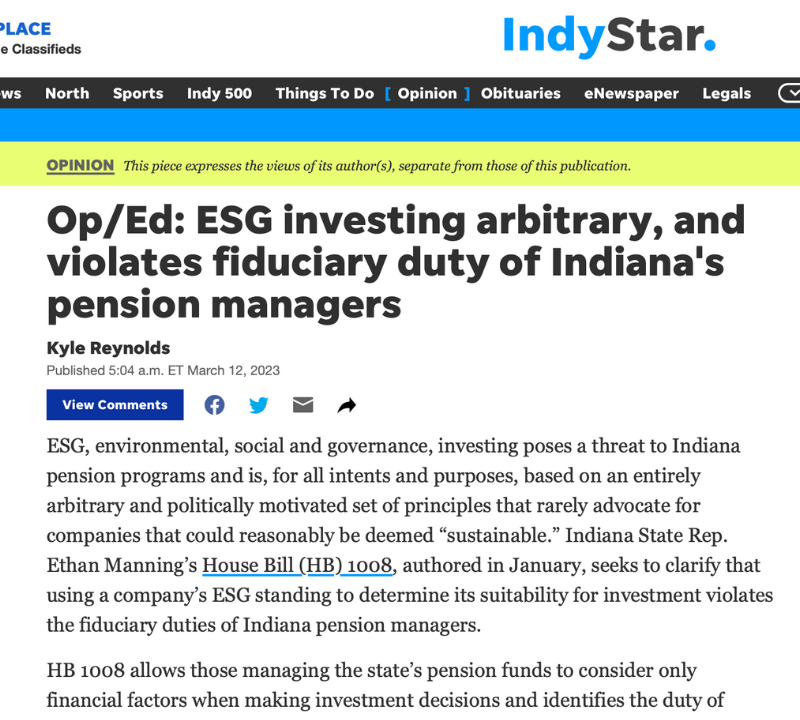CFACT Driessen Fellow Kyle Reynolds, also president of the CFACT club at Indiana University Bloomington, was published in the Indy Star with an op-ed criticizing ESG (Environmental, Social, and Government) investing practices. The op-ed can be accessed on the Indy Star website here. Great work Kyle! It also can be read in full here:
ESG, environmental, social and governance, investing poses a threat to Indiana pension programs and is, for all intents and purposes, based on an entirely arbitrary and politically motivated set of principles that rarely advocate for companies that could reasonably be deemed “sustainable.” Indiana State Rep. Ethan Manning’s House Bill (HB) 1008, authored in January, seeks to clarify that using a company’s ESG standing to determine its suitability for investment violates the fiduciary duties of Indiana pension managers.
HB 1008 allows those managing the state’s pension funds to consider only financial factors when making investment decisions and identifies the duty of those managers as maximizing returns for the funds’ beneficiaries. The bill rightfully asserts that commitments by the managers of those funds to promote ESG goals are inconsistent with their fiduciary duties to the fund’s beneficiaries.
Investing in companies on the basis of their high ESG status and commitments is not an investment strategy aimed at maximizing portfolio health. Complying with ESG standards can be costly for corporations and negatively impact profits. This, in turn, reduces returns for the shareholders of those corporations.
Similarly, not investing in companies because of their poor ESG standing ensures that you will lose out on critical opportunities. For example, in 2020, Blackrock decided that it would divest from coal related companies. Since July 2020, the price of coal has ballooned from less than $50 per ton to close to $400 per ton, a nearly 800% return.
It is clear that basing investment decisions on ESG scores is not a strategy that is likely to maximize returns and portfolio strength. State pension managers that engage in such chicanery should be stripped of their authority to direct and control Hoosiers’ assets.
Indiana pension funds being invested in businesses based on the ESG scores of those companies is also antithetical to the free-market principles the economic policies of this state and country are based upon. Governments should not show preference to any business or corporate entity due to how those companies choose to conduct themselves, provided they are operating within the impartial legal parameters set by the proper authorities. If state pension funds were to be invested using an ESG framework, the Indiana government would essentially be choosing winners and losers in the market.
ESG ratings and rankings are also entirely arbitrary. Even if investing in ESG companies was permissible for pension fund managers, it is not an effective means of affecting change due, in part, to the arbitrariness and meaninglessness of ESG scores. Black Rock’s iShares ESG Aware fund, which the asset management firm champions as featuring stocks in companies with “favorable environmental, social and governance (ESG) ratings,” includes companies such as Exxon Mobil, Meta, Chevron, McDonald’s and Marathon Petroleum. None of these corporations appear particularly socially responsible or environmentally conscious in their business practices. Tesla, a firm whose innovations have reshaped the automobile industry and drawn consumers away from gas powered vehicles and to electric ones, was removed from the S&P 500 ESG index while Exxon still boasts a spot in the index.
ESG scores are arbitrary, meaningless, and politically motivated. Our state’s pension managers have no justification for using them as a means of determining the suitability of an investment.
Kyle Reynolds studies business at Indiana University and serves as the president of CFACT at IU, a chapter of the Committee for a Constructive Tomorrow, which advocates for free-market solutions to environmental issues.



